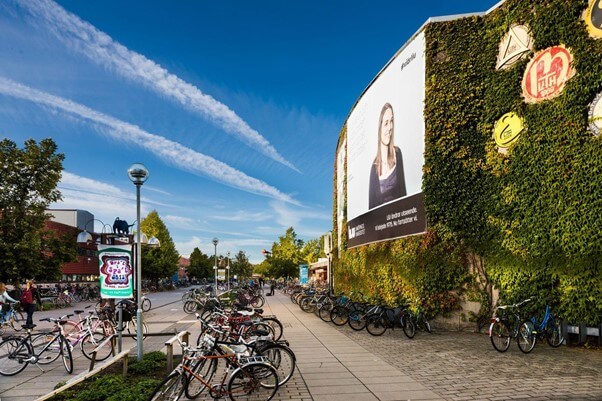
Europe is a living laboratory for changemakers keen on joining or leading the fight for a sustainable and equitable future. Every country is dedicated to making positive changes. For instance, France has worked on decentralising renewable energies since 2015. Meanwhile, the Netherlands has been developing local, sustainable heat provision since 2018. Venice, Italy, has worked on pilot plants for industrial water reuse.
The best part? Crossing borders and witnessing these efforts first-hand is affordable — making Europe the ideal study abroad continent for budding heroes across the globe. The fact that institutes of higher education are following in each country’s footsteps only adds to the appeal.
Most have expressed their commitment to incorporating sustainability into their organisation, culture, and sometimes even their architecture — all to develop more individuals capable of spearheading a better future for this generation and the ones to come. These universities are proof:
University of Gibraltar
Size doesn’t always speak volumes and Gibraltar is living proof. The British Overseas Territory may be compact, but it certainly packs a mean punch. Think lush greenery, exotic animals, picturesque beaches, a vibrant nightlife, easy access to bustling Spain, Morocco, the UK, 300 days of sunshine, and every other quality that makes up a vibrant student experience. If you seek a degree that combines a dynamic destination and career-ready curriculum, consider the University of Gibraltar (UniGib).

If you seek a degree that combines a dynamic destination and career-ready curriculum, consider the University of Gibraltar. Source: University of Gibraltar
UniGib knows feeling at home is crucial when an academic journey of a lifetime awaits, hence, an emphasis on building connections — most of which automatically come to life through personalised attention in small classrooms.
Their efforts cater to one goal: producing employable graduates. In fact, every programme here is designed to support the professional development of students. Take its Bachelor of Business Administration (Hons) (BBA), for instance — a programme designed to produce graduates with genuine business acumen; or the BSc (Hons) Maritime Science with Cadetship — the ultimate pathway into a rewarding career in the maritime industry.
Both programmes are distinctive for being laced with employability skills, experiential opportunities, and expert insights. In just three years, BBA students complete a work-based project with a local company, an eight-week placement, and a 10-week placement. BSc (Hons) Maritime Science students apply knowledge on placements for nine to 12 months (spread over three years). How better to emerge in a booming industry immediately ready to add value? If that’s what you’re after, take your pick from UniGib’s extensive lineup of dynamic courses here.
Durham University
Durham University (DU) — one of Great Britain’s best institutions — is well-known for its impressive repertoire of academic excellence, outstanding research resources and successful graduates. Because of it’s small city location, students are just a mere walk away from everywhere they need to be. There are many breathtaking ancient buildings around campus worth pausing for, including an 11th-century castle that was once a movie set for the Harry Potter series and is currently being used as student accommodation.

Durham University’s Faculty of Social Sciences and Health houses 4,700 undergraduates, 3,300 postgraduates and over 350 faculty — all of whom are engaged in pioneering research and world-class academic programmes. Source: Durham University
Speaking of the Boy Who Lived, Harry Potter fans have a chance to take an accredited module — Harry Potter and the Age of Illusion — to indulge in all things Herbology and Quidditch.
Of course, far more topical subjects — most of which have the power to change the world — are covered at DU. For starters, it is home to a renowned Faculty of Social Sciences and Health where a diverse community of 4,700 undergraduates, 3,300 postgraduates and over 350 faculty are engaged in pioneering research and world-class academic programmes. Departments cover the fundamentals of : Archaeology, Anthropology, Education, Geography, Law, Sociology, and Sport and Exercise Sciences, amongst others.
The Faculty of Social Sciences and Health also provides students access to DU’s Careers and Enterprise Centre, where learners are given the chance to develop skills, gain work experience, explore career options, make effective applications, and even turn bright ideas into new, innovative businesses.
Linköping University
Linköping University (LiU) has four campuses in three cities: Campus Valla and the University Hospital Campus (both in Linköping), Campus Norrköping (in Norrköping) and Campus Lidingö (in Stockholm) — all are in Sweden and surrounded by leafy woods, golden plains and acres of our earth’s natural wonders. Where better to conduct world-leading, boundary-crossing research in fields including materials science, IT and hearing?

LiU’s Department of Science and Technology focuses on technical and scientific disciplines such as organic electronics, media technology, communications and logistics. Source: Linköping University
LiU’s Department of Science and Technology focuses on technical and scientific disciplines such as organic electronics, media technology, communications and logistics. It houses four research environements in an industrial landscape by the Motala River in central Norrköping.
The Communications and Transport Systems division contributes to the development of society in the fields of traffic systems, logistics, communication systems and construction engineering. The Laboratory of Organic Electronics explores the electronic and optical properties of organic materials and organic-inorganic hybrid systems.
The Media and Information Technology division focuses on a separate aspect of visual information technology. Finally, the Physics, Electronics and Mathematics division coducts research and delivers research education in communication electronics, mathematics, engineering didactics, physical electronics, and nanotechnology.
Czech Technical University
Prague is one of Europe’s fastest-growing study abroad locations. While it is a dynamic, artistic, and modern city, it’s the people, lifestyle, academics, safety, and affordability that attract students worldwide. Home to students from over 100 countries, Czech Technical University (CTU) in Prague is one of the largest and oldest technical universities in Europe, belonging to the top 10 best and biggest research institutions in the country.

CTU Faculty of Architecture offers three study programmes: Architecture and Urbanism, Landscape Architecture, and Design. Source: Czech Technical University
Its Faculty of Architecture offers three study programmes: Architecture and Urbanism, Landscape Architecture, and Design — all of which touch on crucial factors that spearhead the building of a better world.
Furthermore, the Faculty researches the reliability of the load-bearing structures of historic buildings alongside the Klokner Institute of CTU, the Faculty of Civil Engineering of CTU, the Institute of Theoretical and Applied Mechanics of the Academy of Sciences of the Czech Republic, the National Monument Institute, the Department of Architecture of the Massachusetts Institute of Technology, Boston, USA, and the Centre d’Histoire des Sciences et des Techniques, Université Paris 1 Panthéon-Sorbonne, Paris, France.
Together, CTU and its partners provide learners with the professional knowledge and skills needed to not only thrive in the contemporary world, but to also maintain respect for modern architecture’s main challenges.
*Some of the institutions featured in this article are commercial partners of Study International










